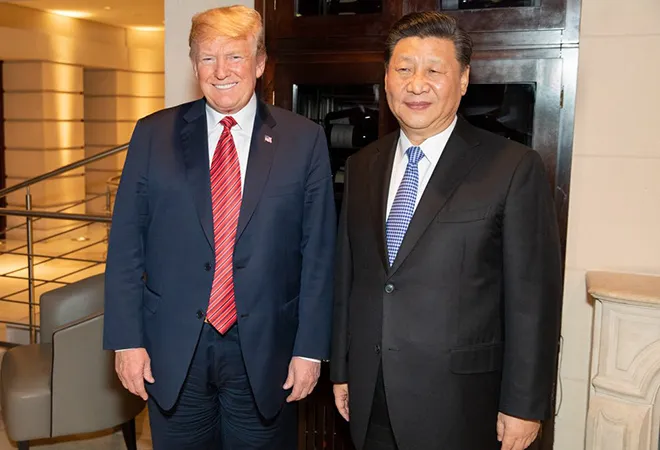The US and China had just about declared truce in their trade war through a phase I deal in January when the coronavirus hit. Now, even as they fight a common threat, the ‘war’ has shifted to the realm of propaganda: China is aggressively touting its success in containing the virus, while the US seeks to name and shame Beijing on its origin.
This should have been a time for a concerted international response; instead we are witnessing national fightbacks, many of them flailing, with no sign of a concerted global response. Presidents Xi Jinping and Donald Trump had their first phone conversation yesterday, over 10 weeks after the gravity of the situation was revealed and the conversation was general, rather than on the specifics of a concerted response using the vast S&T resources of the two nations.
The G7 meeting this week failed to come up with a customary joint statement because the US insisted on reference to the “Wuhan virus”. The G20 meeting that followed did mention the importance of world trade but in passing, and pledged $5 trillion to spur economic recovery. In the words of a former IMF economist, its statement was “long on generalities, short on specifics”. A report says that the US insistence on explicitly stating that the virus originated in Wuhan has stalled a joint declaration at the UN Security Council.
The US and China are in a Thucydides trap and the Covid-19 pandemic has worsened the situation. The geopolitical contest and the pandemic, if prolonged, could upend the world that we have known.
The two countries have moved from being trade partners and collaborators to strategic competitors, a situation that has made international governance more difficult. Their conflict is around technology, the most visible being 5G. The US is moving to restrict export of a range of “foundational technologies” with dual civil and military applications – such as biotechnology, advanced surveillance, 3D printing, artificial intelligence and robotics.
The aim is to constrain the Chinese challenge to US technological supremacy, but this could impede US innovation because of the level of interconnectedness between the two countries.
There has been a lot of talk of decoupling, but that’s a lot of hype. What we could be seeing is a derisking strategy by countries and companies who think they have become too dependent on China. The Covid crisis will add new industries like pharmaceuticals to the list. And what we may see is the building up of redundancies to make our systems more resilient.
A cooperative approach could make that process benign, a combative one will plunge us into deeper waters. The US and Europe are still struggling to meet the twin challenge of containing the virus and keeping their huge economies afloat. Beijing may have controlled the epidemic and gotten its economy going again, but the reality is that China alone cannot pull the global economic engine. With 38% of its exports destined for the US and Europe, China knows that the economic health of both regions is vital for its own well-being. In turn these regions cannot be unaware of the importance of China to their own economies.
The responses of various countries to the economic challenge of the virus have been national. The US’s $2.2 trillion stimulus will just about prevent a social welfare disaster, not revive its economy. India’s modest Rs 1.7 trillion package is unlikely to even address the social distress resulting from the outbreak. As for the G20’s $5 trillion, well, that’s all it is, a promise.
But first things first. Addressing the economic challenge of Covid-19 is important, but it is first essential to extinguish and control the virus itself. Be it smallpox, tuberculosis, or polio, only concerted international action succeeded in checking a contagion. With a pandemic whose full course has yet to be run, and whose properties are yet to be revealed in full, cooperation across national boundaries ought to be the order of the day, and it isn’t, yet.
This commentary originally appeared here
The views expressed above belong to the author(s). ORF research and analyses now available on Telegram! Click here to access our curated content — blogs, longforms and interviews.

